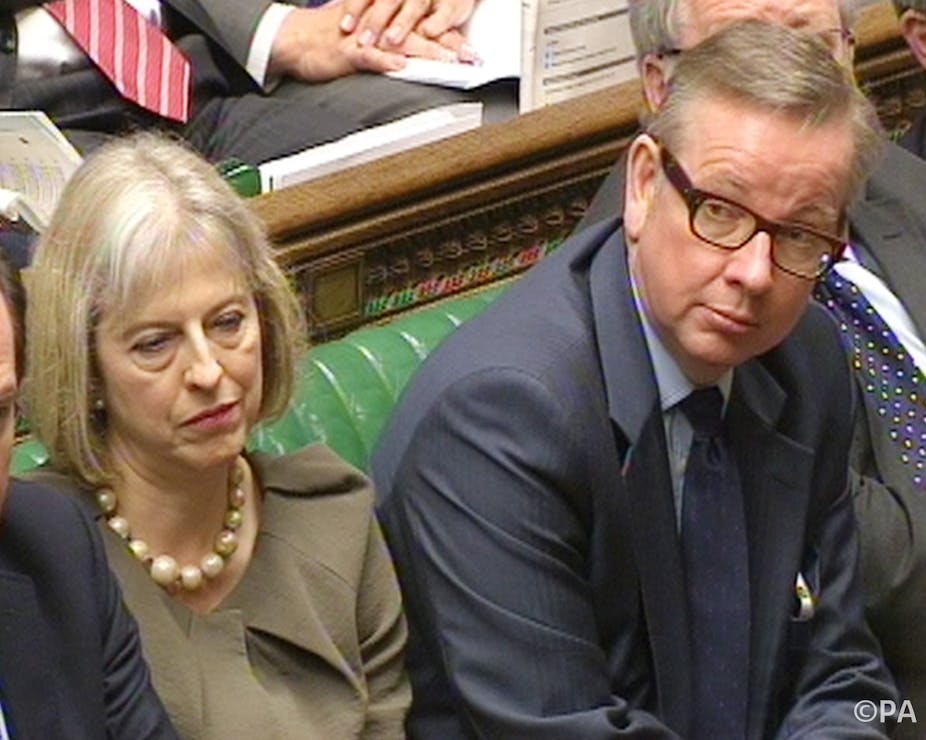Allegations of an “Islamist” plot to infiltrate and take over schools in Birmingham at the centre of Operation Trojan Horse are looking increasingly thin. But they have caused a very public row between education secretary Michael Gove and home secretary Theresa May over how to deal with extremism in schools.
From informal conversations I’ve had over the past few weeks with people from across Birmingham about Trojan Horse – including teachers at some of the schools, local journalists, fellow academics and researchers, and also ordinary people from within the city’s Muslim population – it is striking that hardly anyone has anything bad to say about the schools under investigation. Even fewer believe there was ever a takeover plot.
While speculation continues about what will eventually emerge from the Ofsted inspections undertaken in 21 Birmingham schools in response to the claims, it would seem highly unlikely that any concrete evidence of a wider “plot” will be found.
What is more likely to emerge when the Ofsted reports are released next week are a number of specific issues that will be applicable to specific schools as with any typical Ofsted inspection. This is what seems to be emerging from the drip-feed of leaks that continues to ensure the story remains in the public eye.
The most recent suggestions that Golden Hillock School will be placed into special measures. While a constant stream of information is good for journalists, it also raises a number of serious concerns that go beyond questioning the motivations of those behind the leaks.
One of these relates to the issue of tackling extremism in schools. This was forced into the public domain by the publication of a letter from May to Gove criticising him for failing to adequately deal with the situation.
She raised “serious questions about the quality of school governance”, over claims that the Department for Education was alerted to fears of a takeover plot back in 2008. Yet given there now appears to be little evidence of a “plot”, it appears somewhat bizarre that concerns are being raised about why this was not addressed in the past.
Where responsibility lies
Aside from a power play between two potential future Conservative party leaders, what seems to be at the heart of the May-Gove struggle is a disagreement about extremism and how to deal with it.
Reports have claimed that sources within the home office have accused the Department for Education of running a “parallel security policy”. Gove is thought to believe that a general malaise exists within the Home Office where extremism is only confronted once it develops into terrorism.
Those close to Gove often talk of a “conveyor belt” that carries Muslims from the more conservative forms of Islam directly to Islamist extremism. Gove began to explore this in his 2006 book, Celsius 7/7 – for which the conspiracy theorists will focus on the chapter titled The Trojan Horse.
Widening clampdown
More recently, Gove has sought to extend the government’s definition of extremism. Not least, as implied in May’s letter, by seeking to include restrictions on Muslim girls wearing hijabs as part of a voluntary code of conduct aimed at combating extremism in schools as recommended in the report of the Extremism Task Force published last year. Gove has denied that such issues were being discussed in government.
For some, there are concerns about Gove’s wider opinion of Muslims and Islam, not least because it is claimed he tried to prevent the setting up of the Cross-Government Working Group on anti-Muslim Hatred launched in 2012, something that was not widely known at the time.
It is ironic that at this week’s meeting of that same working group – of which I am an independent member – a number of attendees expressed real concern about “the message” being sent out to Muslims as a result of handling of the Trojan Horse allegations.
And this message will be felt most acutely in Birmingham. As I wrote previously, Operation Trojan Horse has the very real potential to feed into and further reinforce fears and anxieties about Muslims and Islam that already exist in wider society.
At the same time, it has an equal potential to further increase the scrutiny and interrogation of Muslim communities across the city that already feel “suspect”. Let’s not forget that Muslims in Birmingham are still getting over the stigma of being the unwilling victims of the unprecedented levels of surveillance that were introduced in 2008 through the now defunct Project Champion.
Ofsted’s role at stake
There are also big concerns from the Trojan Horse investigation into the independence of the inspection process something that was voiced by a group of leading educationalists. Much of their unease focused on the Guardian story claiming Ofsted’s first inspection of Park View Academy – the school at the centre of the allegations – had cleared the school and had retained its “outstanding” status.

The findings were overturned days later, requiring another inspection. This time a series of relatively minor recommendations were replaced with much more severe criticisms that are likely to see it placed in special measures when the findings are published next week.
Led by Tim Brighouse, a former chief education officer in Birmingham, education experts spoke out, saying such behaviour ran the the very real risk of “tarnishing” all of the findings, in turn bringing into question the political independence of Ofsted as an objective and professional body.
It will be interesting to see if opinions and attitudes in Birmingham change if the Ofsted reports and subsequent investigations do highlight that there was something a little more organised going on in at least some of the schools concerned. We can only speculate until then how that will play out against some of the more pressing concerns highlighted here – that the investigations were pre-determined and that an Islamophobic agenda is present within some political circles.

